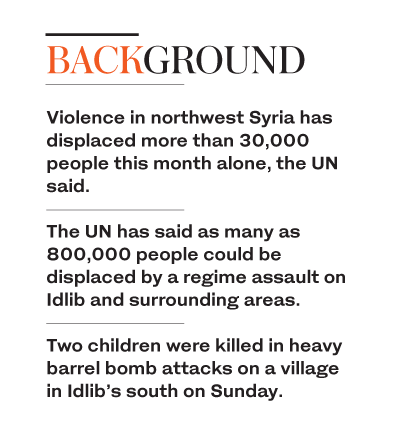The UN’s new humanitarian chief warned Monday that a large-scale military operation against the opposition-held Syrian province of Idlib could create “the worst humanitarian catastrophe” of this century. “There needs to be ways of dealing with this problem that don’t turn the next few months in Idlib into the worst humanitarian catastrophe with the biggest loss of life in the 21st century,” Mark Lowcock said in Geneva.
His remarks came as Syrian troops, backed by Russia and Iran, massed around the northwestern province ahead of an expected onslaught against the largest opposition-held zone left in the country.
Since 2015, Idlib has been home to a complex array of anti-regime forces: Secular fighters, radicals, Syrian terrorists with ties to Al-Qaeda — and their foreign counterparts.
It is home to some 3 million people — around half of them displaced from other parts of the country, according to the UN.
Foreign terrorists now face a fight to the last to hold onto Idlib, their final bastion.
Lowcock acknowledged that “there is a large number of fighters there, including terrorists from proscribed organizations.”
But he stressed that “there are 100 civilians, most of them women and children, for every fighter in Idlib.”
“We are extremely alarmed at the situation, because of the number of people and the vulnerability of the people,” he said, warning that “civilians are severely at risk.”
Detailed planning
A major military operation in Idlib is expected to pose a humanitarian nightmare because there is no nearby opposition territory left in Syria where people could be evacuated to.
While appealing to the warring sides in Syria to avoid a catastrophe, Lowcock said the UN and other aid organizations were all doing “very detailed planning” to be able to respond quickly in the case of a major assault on the province.
“We very actively preparing for the possibility that civilians move in huge numbers in multiple directions,” he said.
He said that the UN had plans to reach up to 800,000 people who might be displaced, and were bracing for around 100,000 people to move into regime-held areas and some 700,000 to initially flee within Idlib.
The UN’s World Food Programme, he said had already prepositioned food stocks for some 850,000 people for the first week or so of any large-scale operation.
“It is a very major preoccupation for us,” he said.
The non-Syrian combatants in Idlib include fighters from Uzbekistan, Chechnya and China’s ethnic Uighur minority who cut their teeth in other wars but then swarmed to Syria to take up the cause.
The threatened assault by the regime could deprive the few thousand left of their last stronghold in their adopted homeland.
“These are people who cannot be integrated into Syria really, under any circumstances, who have nowhere to go and who may just be ready to die in any case,” says Sam Heller, a senior analyst at the International Crisis Group.
“So they’re a real stumbling block to any solution,” said Heller.
In a bid to avert an assault, the top three power brokers in Syria’s war — Russia, Iran, and Turkey — agreed on Friday to work together on “stabilizing” Idlib. But they revealed few details.
A major obstacle to a substantive agreement, observers say, is the fate of terrorists in the province, including foreign hard-liners.



























